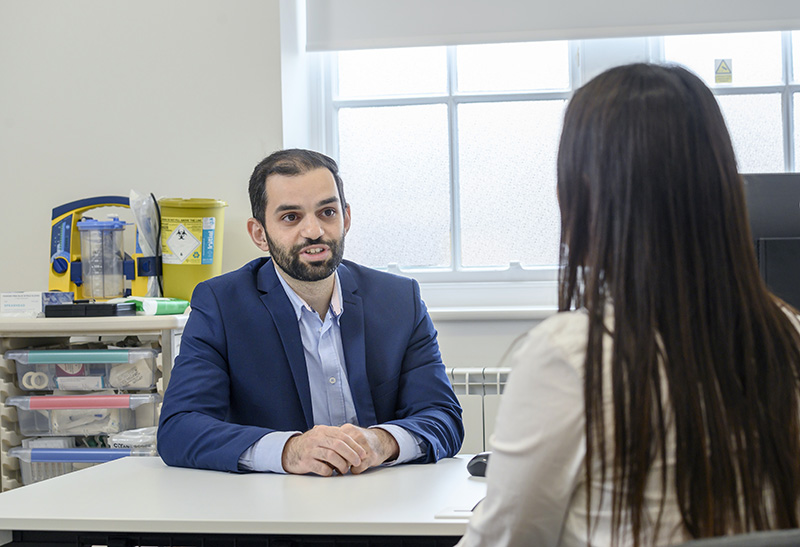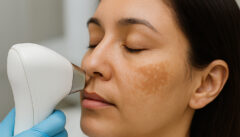Contents
Psoriasis

Our dermatology experts offer advanced treatment plans tailored to your condition, ensuring effective relief from psoriasis-related discomfort and skin concerns.
What is Psoriasis?
Psoriasis is a chronic autoimmune skin condition that causes red, scaly patches to develop on the skin. It occurs when the immune system triggers an overproduction of skin cells, leading to inflammation and plaque formation.
Types of Psoriasis:
- Plaque Psoriasis (Psoriasis Vulgaris) – The most common form, characterized by thick, scaly plaques.
- Guttate Psoriasis – Small, red spots, often triggered by infections.
- Inverse Psoriasis – Smooth, shiny lesions in skin folds (under breasts, armpits, groin).
- Pustular Psoriasis – White pustules surrounded by red skin, often on hands and feet.
- Erythrodermic Psoriasis – A severe, rare type causing widespread redness, peeling, and burning sensations.
Potential Causes
Psoriasis is an autoimmune condition, meaning the immune system mistakenly attacks healthy skin cells. While the exact cause s unknown, several factors can trigger flare-ups. These include;
- Genetics – A family history of psoriasis increases the risk.
- Immune System Dysregulation – Overactive immune responses accelerate skin cell turnover.
- Environmental Triggers – Cold weather, stress, and infections can worsen symptoms.
- Medications – Some drugs, such as beta-blockers and lithium, may trigger psoriasis.
- Lifestyle Factors – Smoking, excessive alcohol consumption, and obesity can contribute to flare-ups..
Signs & Symptoms
The severity of psoriasis varies, but common symptoms include:
- Red, Inflamed Skin Patches – Often covered with silvery-white scales.
- Itching, Burning, or Soreness – Affected areas can feel painful or sensitive.
- Cracked or Bleeding Skin – Severe psoriasis may cause fissures and discomfort.
- Thickened or Ridged Nails – Nail psoriasis can lead to discoloration and brittleness.
- Joint Pain & Stiffness – In some cases, psoriasis is linked to psoriatic arthritis.
Diagnosis
At The Royal Buckinghamshire Hospital, our dermatologists diagnose psoriasis through:
- Clinical Examination – Assessing skin, scalp, and nail changes.
- Skin Biopsy (if needed) – A small sample of skin may be analysed for confirmation.
- Blood Tests – To rule out other conditions that mimic psoriasis.
Treatment Options
While psoriasis is a lifelong condition, treatments can help manage symptoms and prevent flare-ups.
Topical Treatments:
- Corticosteroid Creams – Reduce inflammation and redness.
- Vitamin D Analogues – Slow down excessive skin cell production.
- Moisturizers & Emollients – Relieve dryness and scaling.
Phototherapy – Light Therapy:
- UVB Therapy – Controlled exposure to ultraviolet light to reduce symptoms.
- PUVA Therapy – A combination of UVA light and medication for severe cases.
Systemic Medications – for Moderate to Severe Psoriasis:
- Biologic Injections – Target the immune system to reduce inflammation.
- Oral Medications (Methotrexate, Cyclosporine, Acitretin) – Control severe symptoms.
Lifestyle & Home Remedies:
- Stress Management – Meditation, yoga, and relaxation techniques.
- Dietary Changes – Reducing alcohol, processed foods, and sugar intake.
- Regular Skincare Routine – Using gentle, fragrance-free products.
Monitoring and Follow-Up Care
Psoriasis requires ongoing care and monitoring to manage symptoms effectively. Our dermatology specialists offer:
- Regular Check-Ups – To assess treatment effectiveness and adjust plans if needed.
- Personalized Skincare Advice – Tailored recommendations for managing daily flare-ups.
- Psoriatic Arthritis Screening – Joint assessments to detect early signs of arthritis.
- Psychological Support – Managing the emotional impact of psoriasis.
Arranging To Visit A Private GP

If you are struggling what you might think to be likely Psoriasis, then you can make an appointment with one of our private GPs who can refer you to our specialist dermatologists. Appointments are available to everyone and can often be booked for the same day. There is no need to be registered with our The Royal Buckinghamshire Hospital, or live locally.
If you have insurance which covers a GP visit, we can in most cases invoice the insurer directly. Where you are paying directly, the cost for a 30 minute consultation is £100.
Any additional costs will always be discussed. They could apply if you are referred for an MRI scan, or to a consultant, or for other agreed decisions to support your health.
Our Resident Private GP
Dr Chamali is welcoming and highly experienced. He offers his patients sound diagnosis and treatment, along with individual care focused on their future health.
24 March 2025




